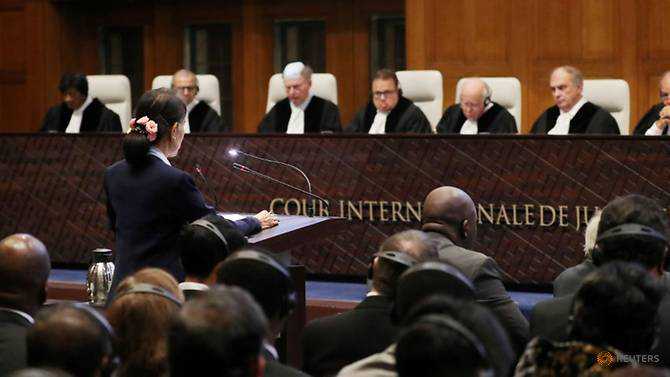World Court to rule on emergency measures in Rohingya genocide case
23 January, 2020

The International Court of Justice on Thursday (Jan 23) will rule on a request for emergency measures by Gambia, which has filed a case against Myanmar against the Muslim minority Rohingya population.
The small West African country launched the lawsuit at the UN's highest body for disputes between states in November, accusing it of violating the 1948 Genocide Convention.
The case has not yet been heard in full and the ruling on Thursday only deals with Gambia's request for so-called preliminary measures. It does not indicate how the court may rule in a final decision, which could take years to reach.
Gambia has asked for a series of protective measures, the equivalent of a restraining order for states, including an immediate stop to the violence. It has also called on judges to order Myanmar to grant access to UN bodies investigating alleged crimes against Rohingya.
More than 730,000 Rohingya fled Myanmar after a military-led crackdown in 2017 and were forced into squalid camps across the border in Bangladesh. UN investigators concluded the military campaign was executed with "genocidal intent".
At Cox's Bazar, the world's largest refugee camp, hopes were running high for a ruling in their favour after years of persecution.
“The entire Rohingya community is praying for justice," said Dil Mohammad, 52, a Rohingya community leader. "We expect that it will deliver a fair judgment."
During a week of hearings last month, Myanmar's civilian leader Aung San Suu Kyi asked the 17-judge panel to drop the case.
While she conceded that disproportionate military force may have been used and civilians killed, she said the acts did not constitute genocide.
Just this week a government-appointed panel established in Myanmar to probe the allegations also said that while there were likely crimes committed by the military there was no indication there was an intent to commit genocide.
Although the Myanmar case in The Hague is only at an early stage, human rights lawyer Akila Radhakrishnan said it has already had an impact.
"Since the case was filed we've seen the government take some action to ensure accountability, like issuing a court martial. Now the military justice system is deeply flawed but its something that wasn't there before," she said, adding that the Myanmar government clearly feels it can no longer "fully ignore" the allegations.
Radhakrishnan said that ordering regular reporting would be big step forward that could pile international pressure on Myanmar to resolve the conflict, possibly at the United Nations.
The World Court's rulings are final and without appeal, but the court has no real way of enforcing them.
Source:
TAG(s):
